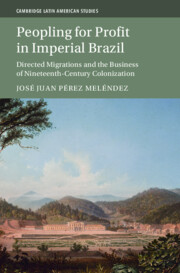 Peopling for Profit in Imperial Brazil
Peopling for Profit in Imperial Brazil Book contents
- Peopling for Profit in Imperial Brazil
- Cambridge Latin American Studies
- Peopling for Profit in Imperial Brazil
- Copyright page
- Dedication
- Contents
- Figures
- Tables
- Acknowledgments
- Note on Currency and Language
- Abbreviations
- Maps
- Introduction
- Part I Colonization’s Statecraft
- Part II Colonization Companies and the Colono Trade
- Part III Disentangling Companies and State
- 6 Cabinets and Companies
- 7 The Dregs of War
- 8 Coolies and Scandals
- Part IV Peopling the Country of the Future
- Conclusion
- Bibliography
- Index
- Series page
7 - The Dregs of War
Emigrant Sweeps at a Time of Global Turmoil
from Part III - Disentangling Companies and State
Published online by Cambridge University Press: 26 September 2024
- Peopling for Profit in Imperial Brazil
- Cambridge Latin American Studies
- Peopling for Profit in Imperial Brazil
- Copyright page
- Dedication
- Contents
- Figures
- Tables
- Acknowledgments
- Note on Currency and Language
- Abbreviations
- Maps
- Introduction
- Part I Colonization’s Statecraft
- Part II Colonization Companies and the Colono Trade
- Part III Disentangling Companies and State
- 6 Cabinets and Companies
- 7 The Dregs of War
- 8 Coolies and Scandals
- Part IV Peopling the Country of the Future
- Conclusion
- Bibliography
- Index
- Series page
Summary
In the 1860s, numerous armed conflicts around the world generated successive waves of expatriates and produced fresh opportunities for colonization entrepreneurs. This chapter traces the entanglements of Brazilian colonization with war-ravaged global scenarios that potentially furnished new streams of foreign colonos to be managed by a diverse assortment of middlemen. The chapter focuses on the efforts of a new political generation in Brazil to attract Confederate veterans from the US South. The Sociedade Internacional de Imigração opened offices in New York, where its agent, Quintino Bocaiúva, worked closely with Cuban intermediaries and helped establish the first steamship line between the US and Brazil. The Sociedade’s remittance of emigrants from New York and New Orleans to Brazil obligated central and provincial government officials to offer a wealth of benefits to newcomers including accommodations, land, and surveying services, in line with the liberal immigration policies that Bocaiúva would espouse decades later.
Keywords
- Type
- Chapter
- Information
- Peopling for Profit in Imperial BrazilDirected Migrations and the Business of Nineteenth-Century Colonization, pp. 224 - 258Publisher: Cambridge University PressPrint publication year: 2024
